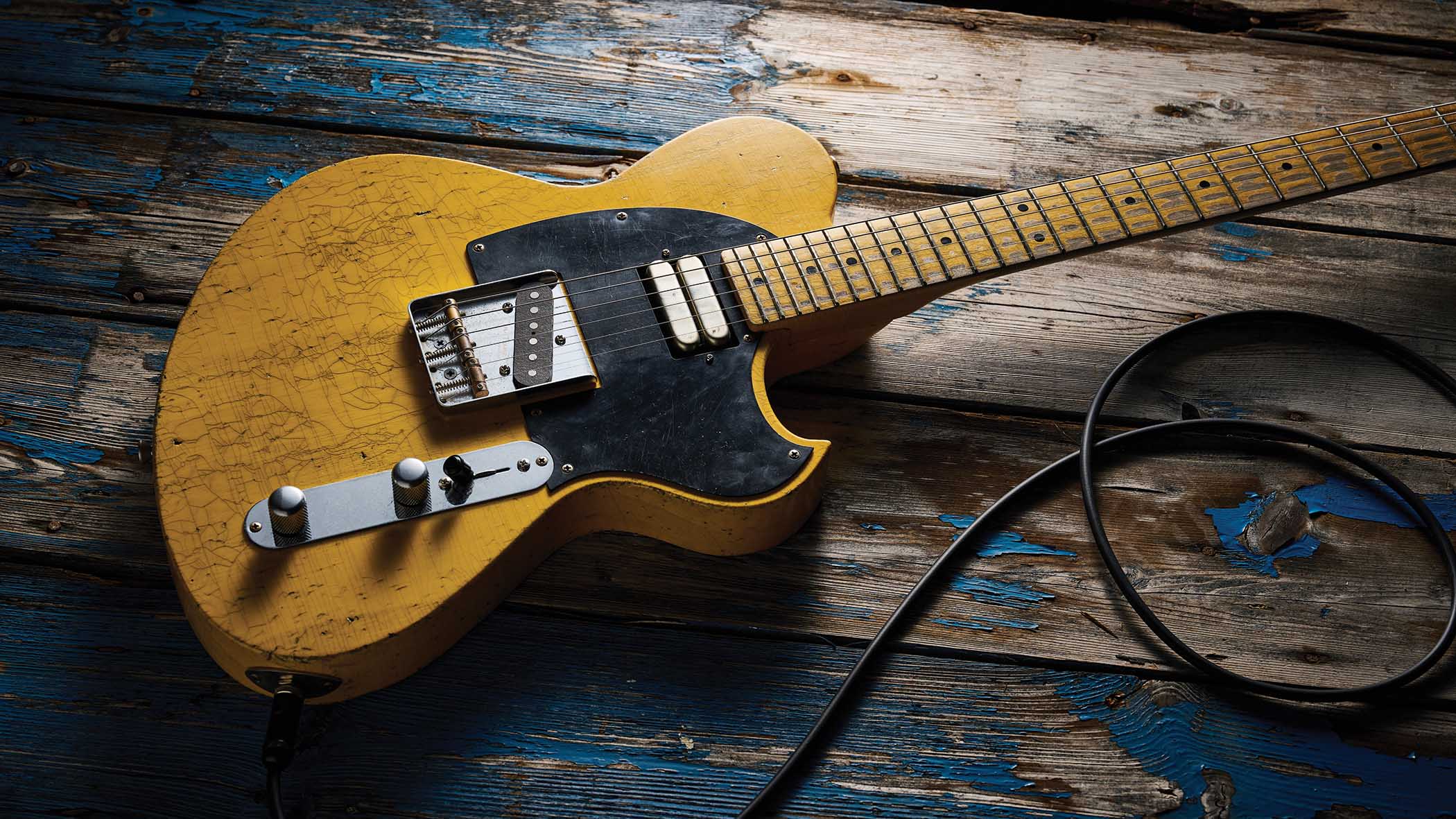“There is a legitimate straight line from me being intimidated by John Petrucci to picking up the acoustic guitar”: Mike Dawes names 10 guitarists who shaped his sound
One of today’s foremost acoustic virtuosos names the players who inspired his awe-inspiring percussive style and changed the game – and offers his pick for “the most criminally underrated name in guitar”

All the latest guitar news, interviews, lessons, reviews, deals and more, direct to your inbox!
You are now subscribed
Your newsletter sign-up was successful
Even before acoustic virtuoso Mike Dawes released Galactic Acid, his first album in eight years, the reaction to its standout original single, Cloud Catcher, moved him to tears.
“Tommy Emmanuel phoned me up an hour after I released it and made me tear up with the kindness he was sharing about it,” he says.
“I can’t really repeat it, but when you get those kinds of compliments from someone like him, it really means something special. Same with Rick Beato. My dad likes it, too.”
Although his career exploded in an era where acoustic YouTube covers could amass millions of views in a matter of days, Dawes isn’t a fan of the way modern playing has been condensed into bite-sized displays of technicality. So, he sought to make his new material the antidote to what he was seeing on social media.
“I wanted to throw every gut-wrenching emotion and every guitar technique into a single seven-plus-minute original to open the record,” he says.
“I was sick of feeling forced into short-form content as a daily reminder of an unpredictable creative future. I know what works well in a live concert – and it isn’t 15-second stupid little fake-ass videos.”
Dawes is something of a road warrior at this stage, whether he’s embarking on large-scale tours with his acoustic sparring partner Emmanuel, supporting prog-metal heavyweights Periphery or tackling Moody Blues classics as part of Justin Hayward’s band.
All the latest guitar news, interviews, lessons, reviews, deals and more, direct to your inbox!
There aren’t many acts who appeal to dad-rock aficionados and djent acolytes alike, and maybe that’s where the acoustic guitar has an advantage.
It means that when Dawes does stray into more progressive territory, usually accompanied by death-defying technique, it’s all grounded in that earthy unplugged response – while that same technicality entrances audiences who are more likely to listen to eight-strings than acoustic steel-strings.
That bringing together of worlds is best exemplified on Push, one of the album’s most ambitious tracks, which seeks to fuse instrumental electric and acoustic guitar via two jaw-dropping guest spots.
“Jack Gardiner and Plini are two of my favourite electric players,” he says. “I had Nick Johnston feature on my previous record and wanted something similar for this one, juxtaposing Jack’s single-coil snarl with Plini’s warm, buttery tone.”
The wonder and optimism of Dawes’ globe-trotting treks found their way into the new record, too – as did the sober return to reality when he was grounded during the pandemic.
“I went to Kenya for Segera, Iceland for All Along the Watchtower and I ripped into my nerves and insecurities for Cloud Catcher,” he says.
“Many of these tracks were pandemic therapy, but every tune is built around the theme of an uncertain near-future. That is what the album is about. Not in the sense of a ‘post-Covid cultural hangover’, but in terms of how technology affects human creativity as a whole. It’s my most emotional and honest record.”
Besides the affecting originals, Dawes had his way with a number of classic tracks from the rock canon – his viral Jump cover released in the wake of Eddie Van Halen’s death, a gut-wrenching take on Foo Fighters’ Everlong and a bold reimagining of All Along the Watchtower.
“The biggest challenge is honestly how ‘out there’ you want to be creatively,” he says of his approach to tackling other artists’ material.
“Everlong is very faithful to the original, but …Watchtower is more of an interpretation. That can be scary, as people get very protective of their favorite songs. But hey, if you’re not saying anything different then why cover it at all, right?”
Which brings us neatly onto the 10 guitarists who shaped his sound. Spread across territories both high-gain and unplugged, they map out the journey of one of today’s brightest acoustic talents – and shine a light on some under-appreciated players in acoustic history, too.
1. Tommy Emmanuel
“I suppose this is an obvious choice, but my mentor and friend Tommy is the greatest to ever do it.
“Spending time on the road and recording with him has been not just a masterclass in writing and performance, but in how to really live and thrive out on the road. I can’t wait for our massive EU run this autumn.
“Normal humans, like you and I, have days where we don’t want to get out of bed or we want to kick the ball down the field a bit. Tommy is always bursting with an infectious optimism and treats everybody he encounters with kindness and compassion.
“This is so important for us as musicians to remember. Our playing is a reflection of ourselves – we need to practice our compassion and humanity as much as our licks.”
2. Petteri Sariola
“I usually joke that my playing at this point is mostly a hybrid of Tommy and Petsku (Petteri). Pete introduced me to luthier Andreas Cuntz and we’ve toured together plenty over the last decade.
“Petteri is one of a kind in his songwriting and right-hand technique, and much like Tommy, an exceptionally giving human.
“His album Phases changed my world when I heard it. I was a fan of his in the MySpace days and sent him a message saying as much. He liked my playing, wrote back asking for my address and mailed out a copy of Phases. It’s a diverse guitar record and a powerful one at that. Sailing is a masterclass in right hand percussive playing in the context of an absolute belter of a chorus. As is I See you Everywhere and The Release.
“I’d argue that Pete is the most criminally underrated name in guitar. He should be in every top 10 list.”
3. Pierre Bensusan
“Pierre is the reason I started playing acoustic steel-string, so he needs to be on this list of course.
“My godfather does Pierre’s graphic design and gave me a tab book he made back in 2007. It was my first introduction to fingerstyle guitar.
“Pierre is the master of DADGAD and integrates jazz harmonies into Celtic-inspired original tunes and arrangements. I learned his song So Long Michael at age 17 as it just hit me in a way I hadn’t felt before. Only later did I discover that it was a posthumous dedication to Michael Hedges, a name I hadn’t heard until that point.
“He is, melodically, unrivalled and a huge part of my education in DADGAD tuning.”
4. Michael Hedges
“The father of my whole scene. Michael was a one-of-a-kind composer and human being who I never had the fortune of discovering while he was alive. His technique helped him fly the most incredible creative kite (I’m butchering one of his own quotes there).
“Once I discovered the Pierre Bensusan tune So Long Michael I found out that, prior to this, Michael had penned a tune titled Bensusan on the album Aerial Boundaries.
“If you don’t know this record, you’re missing out on a truly spiritual experience. What Michael recorded and how it was recorded still blows my mind. My tune Reverie and cover of All Along the Watchtower are both tributes to Michael.”
5. Andy McKee
“Every acoustic guitarist had that ‘WTF’ moment when Andy exploded onto the scene. His massive mega hit Drifting (seriously, has there actually been a more impactful acoustic guitar tune since?) just happened to be in DADGAD – the tuning I was already working through for my Pierre Bensusan studies. It was an obvious discography to dive into.
“I fell in love with Andy’s music, his musicality and tone. He is a very soulful human and you can hear that in his catalog. I went to his shows every time he was in town, with my hair getting progressively longer each time.
“We have toured together since, multiple times, and he has undoubtedly changed the game for my generation and the next. With great power comes great responsibility and Andy wields it well.”
6. Adrian Smith
“Surprisingly (joke), I'm a massive Iron Maiden fan, and although I have yet to arrange a Maiden tune, it's on the list for sure.
“I saw them headline Download Festival in 2003 and it made me want to learn guitar to play live shows. The music and energy, the crowd interaction, all of it. It blew my 13-year-old mind.
“Of their three guitar players, there was always something about Adrian's playing that resonated with me. Maybe it was the opening to Rock in Rio and his Wicker Man solo. I love his sense of melody and how he solos over those classic Maiden progressions. It made me fall in love with the guitar and metal music in a deeper way. Up the Irons.”
7. Justin Hayward
“Justin has been my mentor for 11 years on the road as a songwriter, arranger and a guitar player. I've been Justin's opener and guitarist since 2013, so I've had the opportunity to dive deep into the Moody Blues discography and interact with how he approaches arrangements, and how the guitar can fit into larger mixes both in the forefront and in a more restrained context.
“Last year I backed him up with the Athens State Orchestra in Greece at the Odeon of Herodes Atticus playing the classic Days of Future Passed arrangements. I had to add extra guitar flourishes into an already established and iconic set. Learning how to do that effectively is a skillset that I'm dabbling in more and more because of these opportunities.
“Also, he shreds. If you've seen him play the classic red Gibson 335 up close, you'll know that. Watch him play The Story in Your Eyes.”
8. John Petrucci
“Scenes from a Memory was my first ever favorite album. It may still be, honestly. It's perfect. A friend showed me the Live Scenes from New York DVD as my introduction to Dream Theater and man, when Overture... kicks in. Incredible. The lead playing was like nothing I'd ever heard.
“I couldn't afford a JP Music Man, but that's all I wanted to play for a hot minute. Train of Thought was another record that blew my mind. There is no doubt that John is a household name in the guitar community, so I'm sure all the readers will agree. I still fumble through the As I Am solo from time to time.
“There is a legitimate straight line from being intimidated by John Petrucci to picking up the acoustic guitar. [laughs]”
9. Jon Gomm
“‘Uncle Jon’ has been a mentor since we met in 2009. At this point, I was hitting up a bunch of open mics and small gigs in the south of England. 'Have you heard Jon Gomm?' became a frequent comment.
When I moved to Bath, I saw he was playing a local show, so I went down. It was awesome and so inspiring to see someone utilize unusual guitar techniques with effects like distortion and octave pedals.
“We've played together a bunch over the years. I remember I opened for him when he played Passionflower for the first time. There was no doubt in my mind that this was going to be a groundbreaking song and totally change the game. It did, of course.
“Jon is a true genuine songwriter wearing his heart on his sleeve. His music is raw and yanks at your nerves in a way that bypasses the ‘wow factor’ of the guitar techniques. The same can be said of Petteri Sariola. I love sharing the stage with both of them.”
10. Eddie Van Halen
“There is no influential guitarists list without Eddie. Eddie inspired me directly, but also most of the other people on this list I'm sure.
“There isn’t much to say about the King that hasn't already been said. I'm not talking about tapping etc., but the forward-thinking, proactive approach to upgrading what we know of as guitar and guitar playing.
“Eddie created his own style and pushed it to the mainstream. It was loose and raw and sonically so well thought-out. It had attitude. It was punk. Nowadays you don't really see technically groundbreaking players who still sound badass. It's all a bit clean and shiny.
“I won't go into the whole 'yes but there were technical limitations back then' argument. Nonsense. Eddie was Eddie because he played like a badass in his fingers and fucked around and found out. He wrote riffs and licks that are still relevant.
“I tried my best to cover one of his tunes a few years ago and while dissecting it I discovered so much wonderful nuance. RIP to the King.”
- Galactic Acid is available from August 9 via MikeDawes.com.

Mike has been Editor-in-Chief of GuitarWorld.com since 2019, and an offset fiend and recovering pedal addict for far longer. He has a master's degree in journalism from Cardiff University, and 15 years' experience writing and editing for guitar publications including MusicRadar, Total Guitar and Guitarist, as well as 20 years of recording and live experience in original and function bands. During his career, he has interviewed the likes of John Frusciante, Chris Cornell, Tom Morello, Matt Bellamy, Kirk Hammett, Jerry Cantrell, Joe Satriani, Tom DeLonge, Radiohead's Ed O'Brien, Polyphia, Tosin Abasi, Yvette Young and many more. His writing also appears in the The Cambridge Companion to the Electric Guitar. In his free time, you'll find him making progressive instrumental rock as Maebe.











